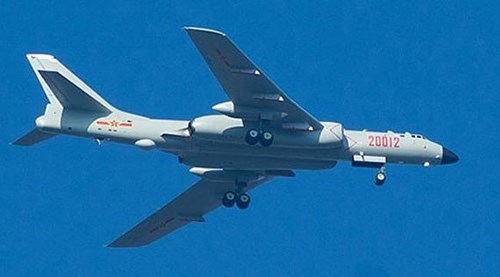China’s growing militarization of the East Sea makes the situation more complicated and probably causes misunderstanding in an area that has already suffered from many conflicts and complexity, Lindsey Ford, Director for Political-Security Affairs at the US’s Asia Society Policy Institute told Vietnam News Agency during a recent briefing by the University of Pennsylvania’s global research center Perry World House.
    |
 |
|
China's H-6K deployed in the East Sea. Source: sggp.org.vn |
The briefing aimed to discuss latest developments in the regional diplomacy, legislation and military as well as policies of the governments of the US, China and other countries regarding to East Sea issues. It was also attended by Prof. Jacques deLisle and Mark Nevitt from the School of Law at the University of Pennsylvania.
Most of the speakers at the briefing said that China has stepped up the militarization of the East Sea with construction of artificial islands and runways, installation of radar facilities and deployment of bombers in the East Sea. They said the US government has shown a clear view that all claimants should hold back to not make the situation any worse.
The US has been concerned over Beijing’s unilateral move to set up an Air Defense Identification Zone (ADIZ) in the East Sea without consultation or discussion with other concerned parties, they said.
They stated that the US wants the East Sea and more broadly, the Pacific and Indian Oceans are open and free, with freedom of navigation and transportation of goods and openness to trade and that the US looks forward to seeing countries in the region to have trade relations based on international law and the principles of freedom, openness, fairness and transparency.
On May 22, Vietnam voiced its opposition against China’s dispatch of bombers to Vietnam’s Hoang Sa archipelago, and requested that China immediately stop sending bombers to conduct drills in the islands.
The move has seriously violated Vietnam’s sovereignty over the archipelago and also run counter to the Vietnam - China agreement on basic principles guiding the settlement of sea-related issues as well as the Declaration on the Conduct of Parties in the East Sea (DOC) between the Association of Southeast Asian Nations (ASEAN) and China, the Vietnamese Foreign Ministry’s spokesperson Le Thi Thu Hang said.
China’s acts have also adversely affected negotiations on the Code of Conduct in the East Sea (COC) between ASEAN and China, and have fuelled tensions as well as caused instability in the region, subsequently hampering efforts to maintain peace, stability and co-operation in the East Sea, she added.
“Vietnam has full legal grounds and historical evidence to affirm its sovereignty over the Hoang Sa and Truong Sa (Spratly) archipelagoes in line with international law,” the official affirmed.
Source: VNA